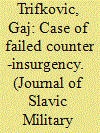| Srl | Item |
| 1 |
ID:
105247


|
|
|
|
|
| Publication |
2011.
|
| Summary/Abstract |
This article examines operations "Weiss" and "Schwarz," two of the largest anti-guerrilla sweeps conducted by the German Wehrmacht during the entire Second World War. Four reinforced divisions with ca. 65,000 German soldiers and up to 100 aircraft took part in what is regarded as the most ferocious fighting of the whole war in Yugoslavia. Although conducted with maximum effort in material terms, they were doomed to failure because of the Third Reich's neglect of guerrilla warfare and the resulting lack of a sound counter-insurgency doctrine. Remarkably, operations "Weiss" and "Schwarz" are almost unknown to the public in the West, despite their sheer size. As the founding myths of socialist Yugoslavia, they were extensively written about, almost always from a Partisan perspective. This is the first article to describe the events from the German point of view, and to analyze the Wehrmacht's conduct of these operations in some depth. With the ongoing COIN campaigns in Iraq and Afghanistan, examining the lessons from the past can prove enlightening.
|
|
|
|
|
|
|
|
|
|
|
|
|
|
|
|
| 2 |
ID:
145504


|
|
|
|
|
| Summary/Abstract |
On 16 October 2014, Russian President Vladimir Putin attended a parade in Belgrade marking the 70th anniversary of its liberation by the Red Army and the Communist-led Yugoslav Partisans. In addition to being a public display of the historic bonds and mutual friendship between the two states, the event also symbolically reaffirmed the role of the Yugoslav Partisans in these operations by parading their old battle flags. In light of strong revisionist tendencies in the past 25 years that sought to diminish or even deny the Partisans’ contribution to the liberation of the country, this represents a small but important gesture. The aim of this article will be to provide an overview of operations in Serbia from late September to late October 1944, to quantify the Partisans’ contribution to the campaign, and to briefly discuss Soviet-Yugoslav cooperation during this period.
|
|
|
|
|
|
|
|
|
|
|
|
|
|
|
|
| 3 |
ID:
140770


|
|
|
|
|
| Summary/Abstract |
The aim of this article is to analyze the operations in Western Serbia and the neighboring regions conducted from March through September 1944 by the Yugoslav Partisans on one side and the Germans and collaborationist troops on the other. Knowledge of these operations is important for understanding subsequent military and political developments, namely the joint Soviet-Partisan offensive on Belgrade and the establishment of the Communist-dominated government in Yugoslavia. Little is known about these events in the West, in particular the details of the military co-operation between the Germans and the Serbian Chetniks, which developed to its full extent during this period. By relying on a wide array of primary sources, the article will hopefully shed some light on these complex issues, as well as help settle the still-existing controversies surrounding the Serbian nationalist guerrillas’ role in the last year of the war.
|
|
|
|
|
|
|
|
|
|
|
|
|
|
|
|